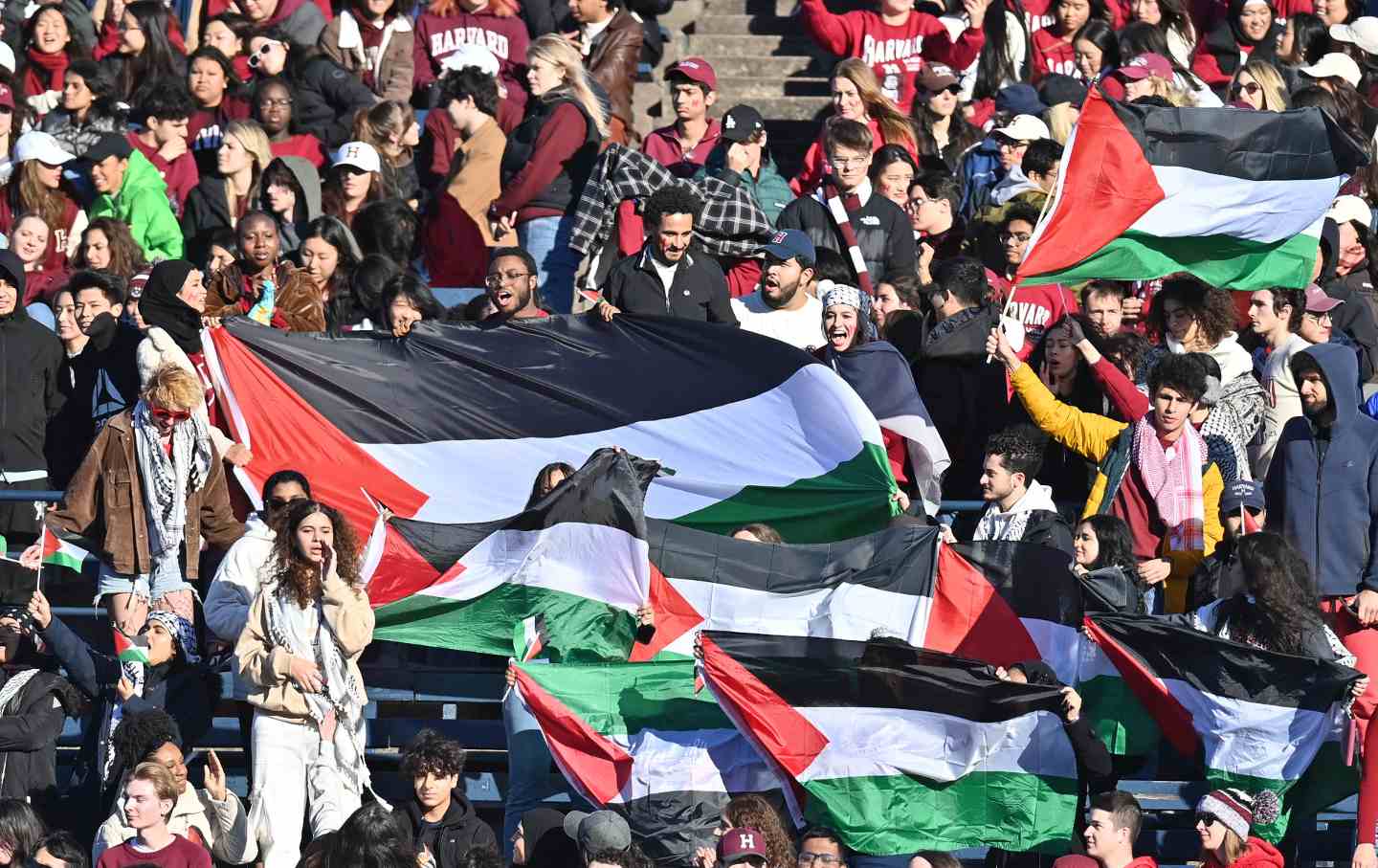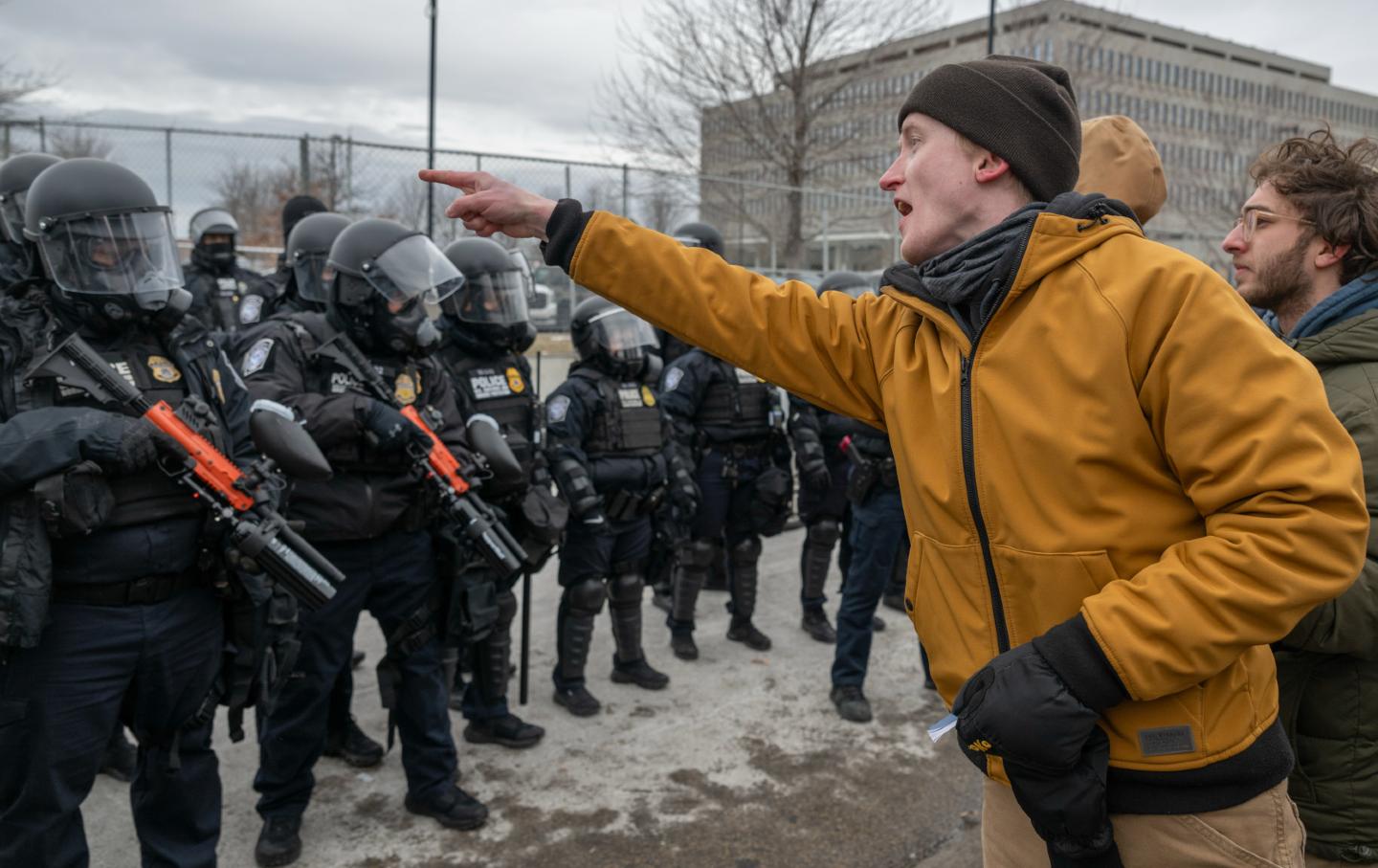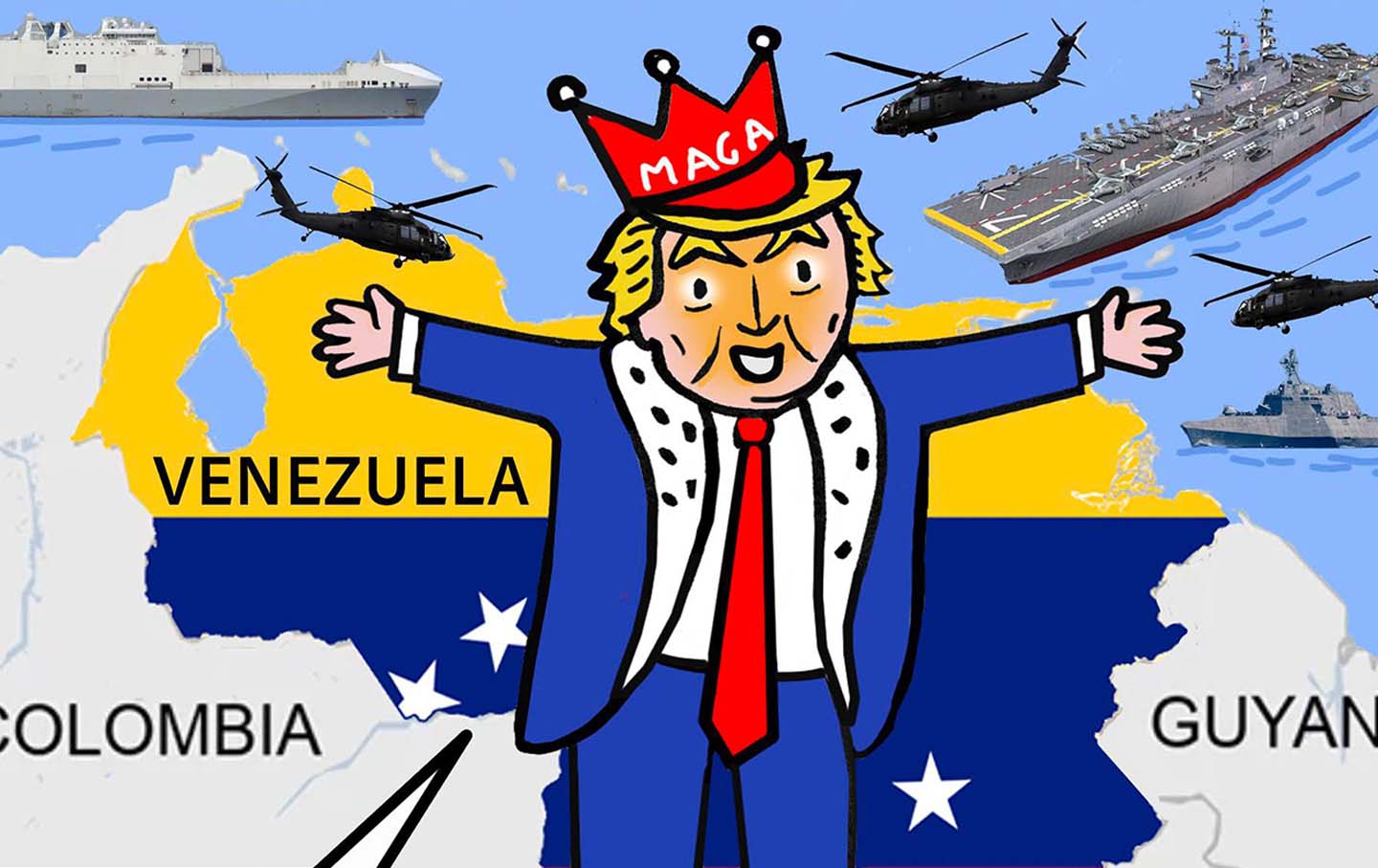The Harvard Law Review Refused to Run This Piece About Genocide in Gaza
The “Harvard Law Review” Refused to Run This Piece About Genocide in Gaza
The piece was nearing publication when the journal decided against publishing it. You can read the article here.

Harvard students protest for Palestine during the Yale-Harvard football game at the Yale Bowl in New Haven, CT November 18, 2023.
(Williams Paul / Icon Sportswire via AP)On Saturday, the board of the Harvard Law Review voted not to publish “The Ongoing Nakba: Towards a Legal Framework for Palestine,” a piece by Rabea Eghbariah, a human rights attorney completing his doctoral studies at Harvard Law School. The vote followed what an editor at the law review described in an e-mail to Eghbariah as “an unprecedented decision” by the leadership of the Harvard Law Review to prevent the piece’s publication.
Eghbariah told The Nation that the piece, which was intended for the HLR Blog, had been solicited by two of the journal’s online editors. It would have been the first piece written by a Palestinian scholar for the law review. The piece went through several rounds of edits, but before it was set to be published, the president stepped in. “The discussion did not involve any substantive or technical aspects of your piece,” online editor Tascha Shahriari-Parsa, wrote Eghbariah in an e-mail shared with The Nation. “Rather, the discussion revolved around concerns about editors who might oppose or be offended by the piece, as well as concerns that the piece might provoke a reaction from members of the public who might in turn harass, dox, or otherwise attempt to intimidate our editors, staff, and HLR leadership.”
On Saturday, following several days of debate and a nearly six-hour meeting, the Harvard Law Review’s full editorial body came together to vote on whether to publish the article. Sixty-three percent voted against publication. In an e-mail to Egbariah, HLR President Apsara Iyer wrote, “While this decision may reflect several factors specific to individual editors, it was not based on your identity or viewpoint.”
In a statement that was shared with The Nation, a group of 25 HLR editors expressed their concerns about the decision. “At a time when the Law Review was facing a public intimidation and harassment campaign, the journal’s leadership intervened to stop publication,” they wrote. “The body of editors—none of whom are Palestinian—voted to sustain that decision. We are unaware of any other solicited piece that has been revoked by the Law Review in this way. “
When asked for comment, the leadership of the Harvard Law Review referred The Nation to a message posted on the journal’s website. “Like every academic journal, the Harvard Law Review has rigorous editorial processes governing how it solicits, evaluates, and determines when and whether to publish a piece…” the note began. ”Last week, the full body met and deliberated over whether to publish a particular Blog piece that had been solicited by two editors. A substantial majority voted not to proceed with publication.”
Today, The Nation is sharing the piece that the Harvard Law Review refused to run.
Genocide is a crime. It is a legal framework. It is unfolding in Gaza. And yet, the inertia of legal academia, especially in the United States, has been chilling. Clearly, it is much easier to dissect the case law rather than navigate the reality of death. It is much easier to consider genocide in the past tense rather than contend with it in the present. Legal scholars tend to sharpen their pens after the smell of death has dissipated and moral clarity is no longer urgent.
Some may claim that the invocation of genocide, especially in Gaza, is fraught. But does one have to wait for a genocide to be successfully completed to name it? This logic contributes to the politics of denial. When it comes to Gaza, there is a sense of moral hypocrisy that undergirds Western epistemological approaches, one which mutes the ability to name the violence inflicted upon Palestinians. But naming injustice is crucial to claiming justice. If the international community takes its crimes seriously, then the discussion about the unfolding genocide in Gaza is not a matter of mere semantics.
The UN Genocide Convention defines the crime of genocide as certain acts “committed with the intent to destroy, in whole or in part, a national, ethnical, racial or religious group, as such.” These acts include “killing members of a protected group” or “causing serious bodily or mental harm” or “deliberately inflicting on the group conditions of life calculated to bring about its physical destruction in whole or in part.”
Numerous statements made by top Israeli politicians affirm their intentions. There is a forming consensus among leading scholars in the field of genocide studies that “these statements could easily be construed as indicating a genocidal intent,” as Omer Bartov, an authority in the field, writes. More importantly, genocide is the material reality of Palestinians in Gaza: an entrapped, displaced, starved, water-deprived population of 2.3 million facing massive bombardments and a carnage in one of the most densely populated areas in the world. Over 11,000 people have already been killed. That is one person out of every 200 people in Gaza. Tens of thousands are injured, and over 45% of homes in Gaza have been destroyed. The United Nations Secretary General said that Gaza is becoming a “graveyard for children,” but a cessation of the carnage—a ceasefire—remains elusive. Israel continues to blatantly violate international law: dropping white phosphorus from the sky, dispersing death in all directions, shedding blood, shelling neighborhoods, striking schools, hospitals, and universities, bombing churches and mosques, wiping out families, and ethnically cleansing an entire region in both callous and systemic manner. What do you call this?
The Center for Constitutional Rights issued a thorough, 44-page, factual and legal analysis, asserting that “there is a plausible and credible case that Israel is committing genocide against the Palestinian population in Gaza.” Raz Segal, a historian of the Holocaust and genocide studies, calls the situation in Gaza “a textbook case of Genocide unfolding in front of our eyes.” The inaugural chief prosecutor of the International Criminal Court, Luis Moreno Ocampo, notes that “Just the blockade of Gaza—just that—could be genocide under Article 2(c) of the Genocide Convention, meaning they are creating conditions to destroy a group.” A group of over 800 academics and practitioners, including leading scholars in the fields of international law and genocide studies, warn of “a serious risk of genocide being committed in the Gaza Strip.” A group of seven UN Special Rapporteurs has alerted to the “risk of genocide against the Palestinian people” and reiterated that they “remain convinced that the Palestinian people are at grave risk of genocide.” Thirty-six UN experts now call the situation in Gaza “a genocide in the making.” How many other authorities should I cite? How many hyperlinks are enough?
And yet, leading law schools and legal scholars in the United States still fashion their silence as impartiality and their denial as nuance. Is genocide really the crime of all crimes if it is committed by Western allies against non-Western people?
This is the most important question that Palestine continues to pose to the international legal order. Palestine brings to legal analysis an unmasking force: It unveils and reminds us of the ongoing colonial condition that underpins Western legal institutions. In Palestine, there are two categories: mournable civilians and savage human-animals. Palestine helps us rediscover that these categories remain racialized along colonial lines in the 21st century: the first is reserved for Israelis, the latter for Palestinians. As Isaac Herzog, Israel’s supposed liberal President, asserts: “It’s an entire nation out there that is responsible. This rhetoric about civilians not aware, not involved, it’s absolutely not true.”
Palestinians simply cannot be innocent. They are innately guilty; potential “terrorists” to be “neutralized” or, at best, “human shields” obliterated as “collateral damage”. There is no number of Palestinian bodies that can move Western governments and institutions to “unequivocally condemn” Israel, let alone act in the present tense. When contrasted with Jewish-Israeli life—the ultimate victims of European genocidal ideologies—Palestinians stand no chance at humanization. Palestinians are rendered the contemporary “savages” of the international legal order, and Palestine becomes the frontier where the West redraws its discourse of civility and strips its domination in the most material way. Palestine is where genocide can be performed as a fight of “the civilized world” against the “enemies of civilization itself.” Indeed, a fight between the “children of light” versus the “children of darkness.”
The genocidal war waged against the people of Gaza since Hamas’s excruciating October 7th attacks against Israelis—attacks which amount to war crimes—has been the deadliest manifestation of Israeli colonial policies against Palestinians in decades. Some have long ago analyzed Israeli policies in Palestine through the lens of genocide. While the term genocide may have its own limitations to describe the Palestinian past, the Palestinian present was clearly preceded by a “politicide”: the extermination of the Palestinian body politic in Palestine, namely, the systematic eradication of the Palestinian ability to maintain an organized political community as a group.
This process of erasure has spanned over a hundred years through a combination of massacres, ethnic cleansing, dispossession, and the fragmentation of the remaining Palestinians into distinctive legal tiers with diverging material interests. Despite the partial success of this politicide—and the continued prevention of a political body that represents all Palestinians—the Palestinian political identity has endured. Across the besieged Gaza Strip, the occupied West Bank, Jerusalem, Israel’s 1948 territories, refugee camps, and diasporic communities, Palestinian nationalism lives.
What do we call this condition? How do we name this collective existence under a system of forced fragmentation and cruel domination? The human rights community has largely adopted a combination of occupation and apartheid to understand the situation in Palestine. Apartheid is a crime. It is a legal framework. It is committed in Palestine. And even though there is a consensus among the human rights community that Israel is perpetrating apartheid, the refusal of Western governments to come to terms with this material reality of Palestinians is revealing.
Once again, Palestine brings a special uncovering force to the discourse. It reveals how otherwise credible institutions, such as Amnesty International or Human Rights Watch, are no longer to be trusted. It shows how facts become disputable in a Trumpist fashion by liberals such as President Biden. Palestine allows us to see the line that bifurcates the binaries (e.g. trusted/untrusted) as much as it underscores the collapse of dichotomies (e.g. democrat/republican or fact/claim). It is in this liminal space that Palestine exists and continues to defy the distinction itself. It is the exception that reveals the rule and the subtext that is, in fact, the text: Palestine is the most vivid manifestation of the colonial condition upheld in the 21st century.
Popular
“swipe left below to view more authors”Swipe →What do you call this ongoing colonial condition? Just as the Holocaust introduced the term “Genocide” into the global and legal consciousness, the South African experience brought “Apartheid” into the global and legal lexicon. It is due to the work and sacrifice of far too many lives that genocide and apartheid have globalized, transcending these historical calamities. These terms became legal frameworks, crimes enshrined in international law, with the hope that their recognition will prevent their repetition. But in the process of abstraction, globalization, and readaptation, something was lost. Is it the affinity between the particular experience and the universalized abstraction of the crime that makes Palestine resistant to existing definitions?
Scholars have increasingly turned to settler-colonialism as the lens through which we assess Palestine. Settler-colonialism is a structure of erasure where the settler displaces and replaces the native. And while settler-colonialism, genocide, and apartheid are clearly not mutually exclusive, their ability to capture the material reality of Palestinians remains elusive. South Africa is a particular case of settler-colonialism. So are Israel, the United States, Australia, Canada, Algeria, and more. The framework of settler colonialism is both useful and insufficient. It does not provide meaningful ways to understand the nuance between these different historical processes and does not necessitate a particular outcome. Some settler colonial cases have been incredibly normalized at the expense of a completed genocide. Others have led to radically different end solutions. Palestine both fulfills and defies the settler-colonial condition.
We must consider Palestine through the iterations of Palestinians. If the Holocaust is the paradigmatic case for the crime of genocide and South Africa for that of apartheid, then the crime against the Palestinian people must be called the Nakba.
The term Nakba, meaning “Catastrophe,” is often used to refer to the making of the State of Israel in Palestine, a process that entailed the ethnic cleansing of over 750,000 Palestinians from their homes and destroying 531 Palestinian villages between 1947 to 1949. But the Nakba has never ceased; it is a structure not an event. Put shortly, the Nakba is ongoing.
In its most abstract form, the Nakba is a structure that serves to erase the group dynamic: the attempt to incapacitate the Palestinians from exercising their political will as a group. It is the continuous collusion of states and systems to exclude the Palestinians from materializing their right to self-determination. In its most material form, the Nakba is each Palestinian killed or injured, each Palestinian imprisoned or otherwise subjugated, and each Palestinian dispossessed or exiled.
The Nakba is both the material reality and the epistemic framework to understand the crimes committed against the Palestinian people. And these crimes—encapsulated in the framework of Nakba—are the result of the political ideology of Zionism, an ideology that originated in late nineteenth century Europe in response to the notions of nationalism, colonialism, and antisemitism.
As Edward Said reminds us, Zionism must be assessed from the standpoint of its victims, not its beneficiaries. Zionism can be simultaneously understood as a national movement for some Jews and a colonial project for Palestinians. The making of Israel in Palestine took the form of consolidating Jewish national life at the expense of shattering a Palestinian one. For those displaced, misplaced, bombed, and dispossessed, Zionism is never a story of Jewish emancipation; it is a story of Palestinian subjugation.
What is distinctive about the Nakba is that it has extended through the turn of the 21st century and evolved into a sophisticated system of domination that has fragmented and reorganized Palestinians into different legal categories, with each category subject to a distinctive type of violence. Fragmentation thus became the legal technology underlying the ongoing Nakba. The Nakba has encompassed both apartheid and genocidal violence in a way that makes it fulfill these legal definitions at various points in time while still evading their particular historical frames.
Palestinians have named and theorized the Nakba even in the face of persecution, erasure, and denial. This work has to continue in the legal domain. Gaza has reminded us that the Nakba is now. There are recurring threats by Israeli politicians and other public figures to commit the crime of the Nakba, again. If Israeli politicians are admitting the Nakba in order to perpetuate it, the time has come for the world to also reckon with the Palestinian experience. The Nakba must globalize for it to end.
We must imagine that one day there will be a recognized crime of committing a Nakba, and a disapprobation of Zionism as an ideology based on racial elimination. The road to get there remains long and challenging, but we do not have the privilege to relinquish any legal tools available to name the crimes against the Palestinian people in the present and attempt to stop them. The denial of the genocide in Gaza is rooted in the denial of the Nakba. And both must end, now.
More from The Nation

Notes on Transsexual Surgery Notes on Transsexual Surgery
An abundance of plastic surgery is not a net good. But discussions over its morality would be better off viewing it less as unfettered desire and more as self-determination.

This Is Not Solidarity. It Is Predation. This Is Not Solidarity. It Is Predation.
The Iranian people are caught between severe domestic repression and external powers that exploit their suffering.

It’s Official: The People, Not the Politicians, Are Leading It’s Official: The People, Not the Politicians, Are Leading
In this week’s Elie V. US, our justice correspondent explores the fecklessness of the Democratic Party, MAGA racism, and fighting despite unwinnable odds.

The Week of Colonial Fever Dreams From a Sundowning Fascist The Week of Colonial Fever Dreams From a Sundowning Fascist
The news was a firehose of stories of authoritarian behavior. We can’t let ourselves drown.

Self-Appointed King of Venezuela Self-Appointed King of Venezuela
The United States attacks Venezuela and captures President Maduro. Trump claims that the US will “run” the country for oil interests.



